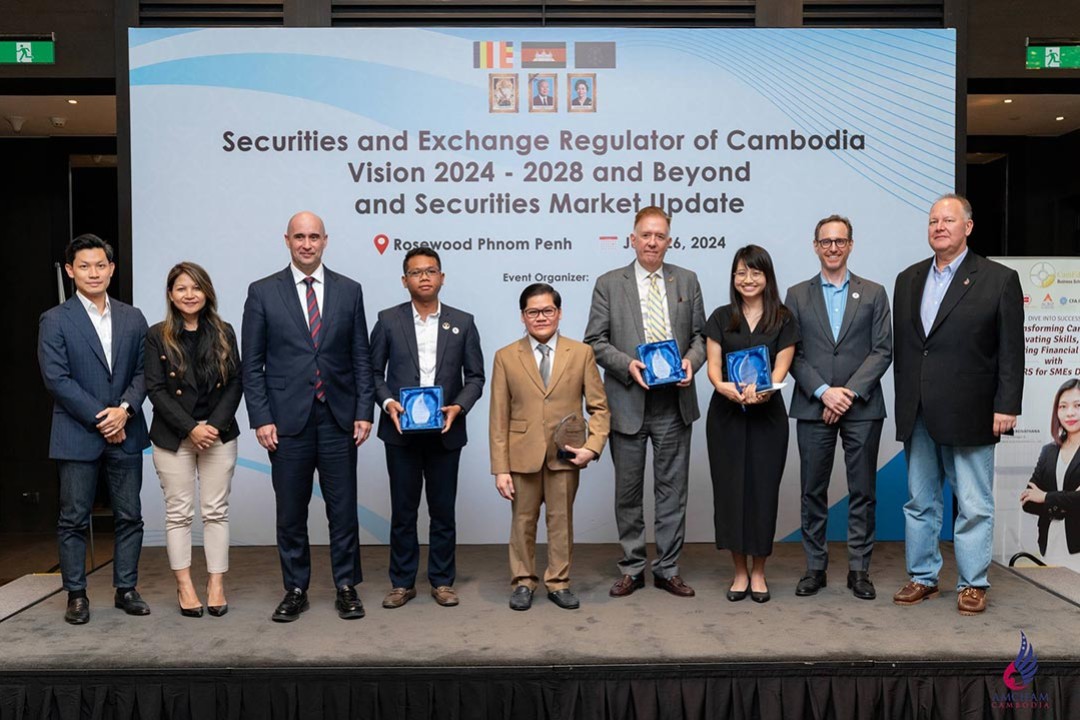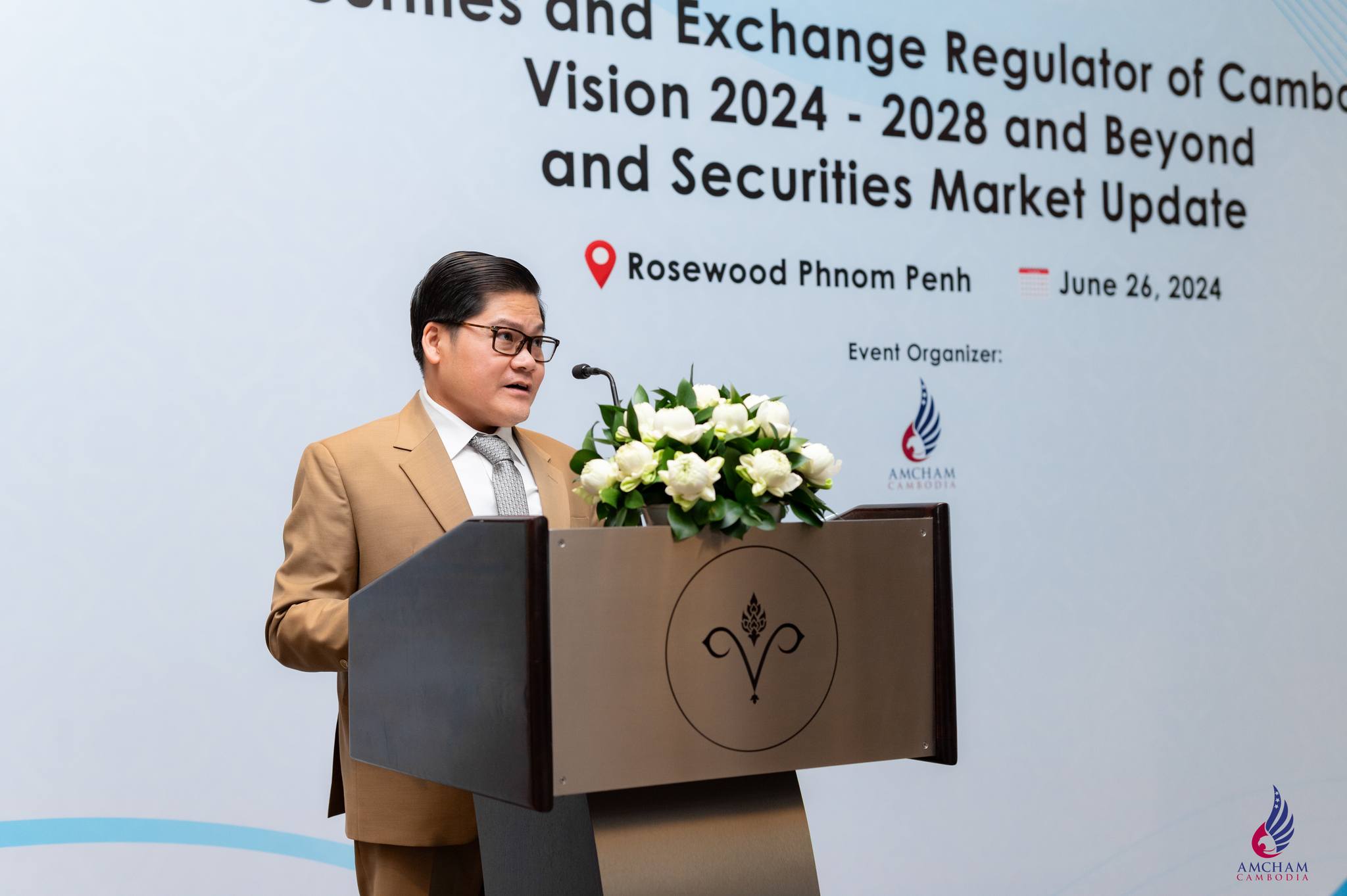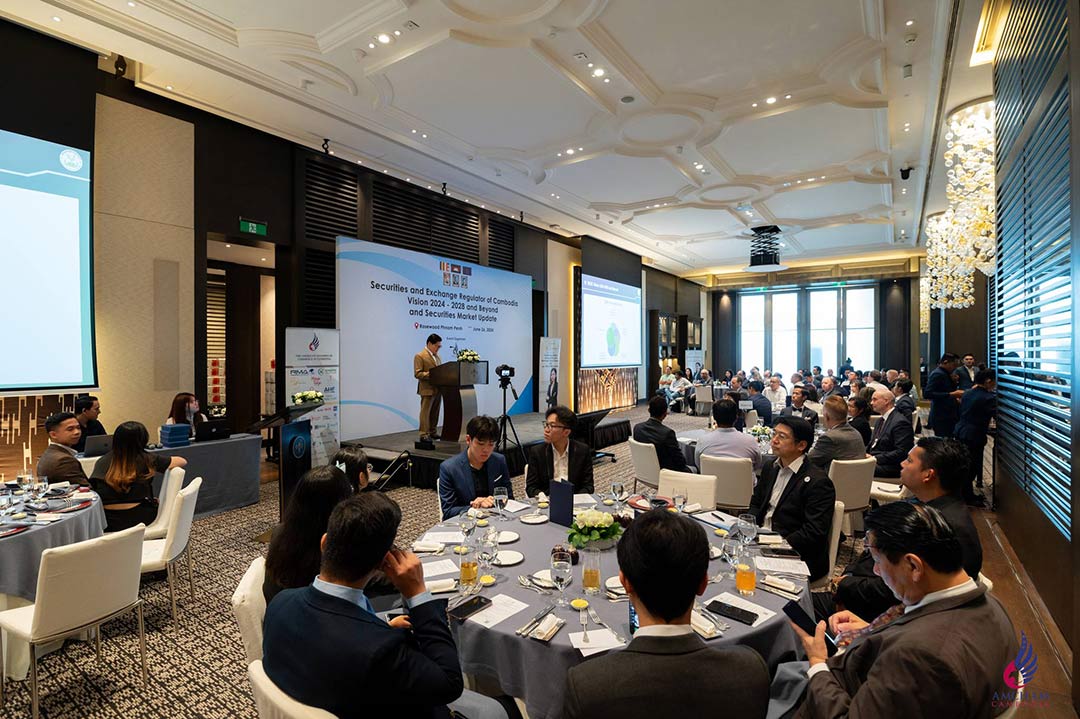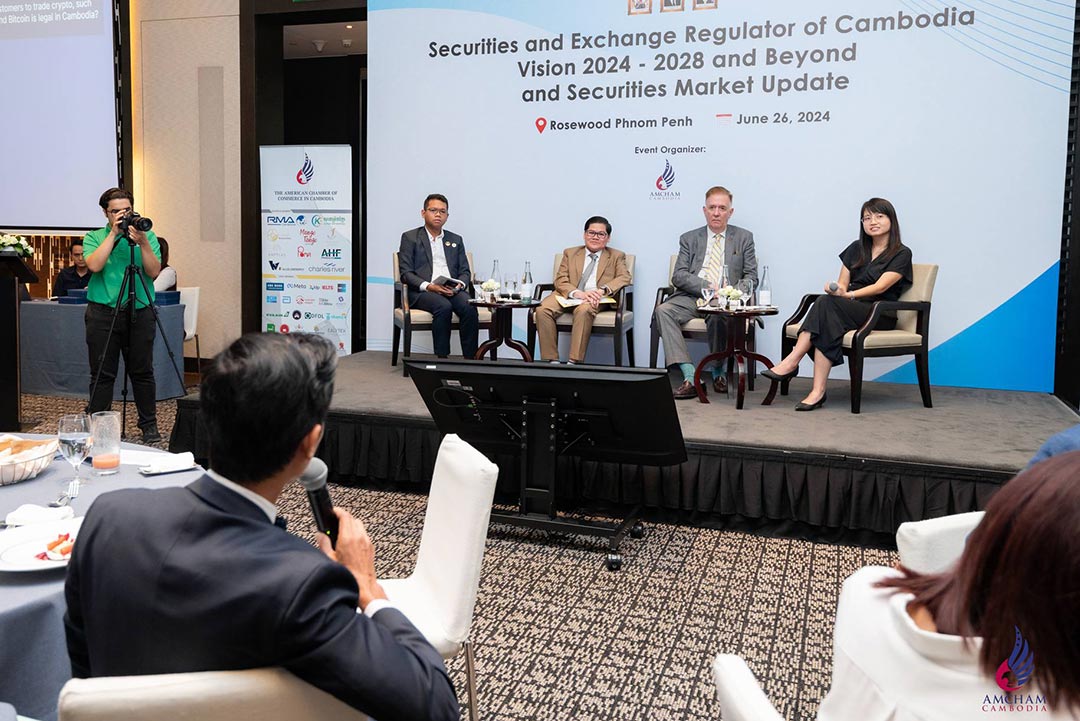
The American Chamber of Commerce (AmCham) in Cambodia organised a luncheon on June 26, 2024 at Rosewood Phnom Penh, focused on sharing the vision and plans of the Securities and Exchange Regulator of Cambodia (SERC) for the Cambodian securities market in 2024-2028 and beyond.
The workshop was presided over by H.E. Sou Socheat, Director General of the SERC, and featured the participation of SERC delegates, AmCham board members and various representatives of private sector businesses.
Delivering the welcoming remarks, Casey Barnett, President of AmCham Cambodia, expressed the chamber’s commitment to supporting the SERC and the development of Cambodia’s capital markets.
“The American Chamber of Commerce in Cambodia welcomes and supports the hard work that the Securities and Exchange Regulator in Cambodia has been doing to develop the capital markets,” said Barnett.
He added that AmCham supports this development for three main reasons:
- To encourage securities as an investment opportunity for both retail investors and institutional investors;
- To provide investors liquidity in their investments, with the belief that greater liquidity will further encourage foreign direct investment (FDI) into Cambodia;
- To reduce risks with added monitoring and reliability, especially as companies listed on the Cambodia Securities Exchange (CSX) are expected to adhere to the highest level of transparency and corporate disclosure in Cambodia.

Securities And Exchange Regulator Of Cambodia 2024-2028 Vision
After presenting an overview of the history of Cambodia’s securities sector, H.E. Sou Socheat shared some of the regulator’s broad mission and aims for the 2024-2028 period and beyond.
“In the journey of developing this sector, we have to make sure that all we have done and the actions that we put in place for the next five years complies with our national strategy, including the government’s Pentagonal Strategy-Phase One, and also the Cambodia Digital Economy and Society Roadmap 2021-2035,” remarked Socheat.
He highlighted the following five key development areas the SERC seeks to focus on.
Market Participants And Infrastructure
After assessing the challenges and issues faced by the SERC in the last 10 years of developing Cambodia’s securities market, Socheat shared that the regulator has identified the following action policies to expand market participants and securities infrastructure:
- Attract more companies to list on the CSX
- Introduce a risk management framework to supervise permitted securities exchange operators
- Transition to risk-based supervision to supervise permitted securities exchange operators
- Improve compliance of state-owned enterprises (SOEs) with corporate governance requirements
- Encourage foreign portfolio investors to invest in the securities market
- Encourage the development of the securities market through working with other domestic regulators – for example the insurance regulator and social security regulator, setting standards for insurance companies, pension fund management and more
- Further develop the government bond market – Socheat added that in 2024, government bonds had so far raised close to USD $50 million, so by the end of the year it is possible they will meet the target of raising more than USD $100 million
- Develop FinTech Regulatory Sandbox in the securities sector to effectively regulate fintech products and digital assets – most recently, in early 2024, the first licensed digital asset exchange, RGX, was launched in Cambodia

Legal And Regulatory Framework
For the development of the legal and regulatory framework, Socheat shared that the SERC aims to:
- Develop a commodity futures
- Develop financial derivatives market – the SERC is currently in the process of developing this market with the IFC to implement new regulations and introduce new derivative products such as swaps, forwards, futures and options
- Develop regulation related to securities financing and securities margin financing
- Adopt and promote corporate governance – Socheat shared that the SERC’s draft corporate governance code is already done and should begin implementation from around the end of 2024, which will feature certain points that are compulsory for all listed companies to follow, as well as other points which are voluntary
- Promote sustainability disclosure
- Develop regulation framework for digital assets, peer-to-peer financing
- Develop regulatory framework for crowdfunding
- Develop regulatory framework for FinTech securities sector
Supervisory Framework
The regulator plans to set up regulations on market abuse, for which the SERC aims to work alongside the Ministry of Justice (MoJ) to integrate a process of market abuse case management, and an IT system for digital reporting and market abuse detection. Accordingly, Socheat added that the SERC must work on developing a cybersecurity framework for technology risk management (TRM) in the securities sector with experts.
Capacity Building And Infrastructure
The regulator will continue to work towards developing the capacity of its own staff through, for example, sending officials to conduct more on-the-job training with foreign securities regulators such as in Singapore. The SERC will also focus on strengthening its internal systems to support and manage electronic filing, enhancing the trading and settlement system infrastructure to handle new assets and reduce risk, developing financial literacy by exploring the opportunity to develop university curriculum, and further building capacity and public awareness of FinTech in the securities sector.
Other Areas
The SERC’s other priorities include reducing barriers to development caused by dollarisation, establishing an investor protection fund, and introducing medium-term budgeting.
Socheat stressed that all the actions taken by the SERC in the next five years will need to follow two overarching visions guided by sustainability and digital transformation.

Promoting A Sustainable Securities Market In Cambodia
Cambodia will require a significant amount of climate financing as the government strives to further reduce greenhouse gas emissions in line with the country’s revised National Determined Contributions (NDCs). Socheat emphasised that the securities market can act as an alternative source of financing to help Cambodia meet its goals.
“According to the updated National Determined Contributions (NDCs), our government has prioritised climate mitigation and adaptation in its national development strategy, requiring an estimated 7.8 billion USD in funding, so the market will play a crucial role in bridging the financial gap, therefore the SERC has put in place many actions to support sustainable development,” said Socheat.
Such actions include adopting the guideline on the issuance of green, social and sustainability bonds, and promoting the listing and investment of sustainable bonds. The SERC Director General shared that the regulator works closely with partners such as the Asian Development Bank (ADB), Global Green Growth Institute (GGGI) and UN ESCAP to provide capacity building and technical assistance to issuing companies through the Cambodia Sustainable Bond Accelerator Program (CSBA).
Most recently, on June 28, 2024, Royal Group Phnom Penh SEZ (RGPPSEZ) held the official listing ceremony for its KHR 41 billion (roughly USD 10 million) green bond aftering receiving support from the CSBA. RGPPSEZ bond follows green and sustainable bonds listed by Golden Tree and CAMGSM (Cellcard).
Socheat added that the SERC is also currently in the process of conducting a feasibility study on developing Cambodia’s carbon market.
We believe that setting up the carbon exchange will lead us to achieve the Paris Agreement, SDG goals and our Net Zero commitment. Therefore, by 2030, we expect to have a variety of sustainable products including thematic bonds, sustainable link bonds, sustainable and responsible investment, and also, why not, a carbon market.

Digital Securities – DeFi, Digital Assets And Blockchain-Based Trading Platforms In Cambodia
The SERC currently has a FinTech Regulatory Sandbox in which companies can experiment with innovative financial products or services. Socheat mentioned that the regulator has so far approved one platform (RGX, Cambodia’s first licensed digital asset exchange) with many more under application and review.
He added that the SERC is also focusing on key innovation areas including Decentralised Finance (DeFi), digital assets and blockchain technology, as innovative financial products or services under these areas have the potential to make Cambodia’s securities market more liquid and attractive, increase efficiency and risk management, and create more opportunities.
Socheat added that the regulator will also target to strengthen Regulatory Technology (RegTech) and Supervisory Technology (SupTech) to aid in functions such as digital reporting management, digital filings, licensing applications, corporate disclosures and more.
The SERC’s desired FinTech level for the securities market, he shared, would involve achieving maturity through the purchase of securities and financial instruments across the following thematic areas:
- Core market infrastructure: Exploring technology promoting decentralisation such as blockchain and distributed ledger technology (DLT) used in settlement systems and payments
- Optimising post-trade operations: Using RegTech, Compliance Management, etc.
- Emerging technology: Using Big Data, artificial intelligence (AI), and machine learning (ML) to manage myriad data sources;
- Alternative funding platforms: Such as Crowdfunding and P2P financing platforms.
“All of [these goals], to make them all happen, we must work together, not only the SERC,” appealed Socheat. “We encourage companies to start as investors, to become issuers, and sustainable bond issuers, that will not only support the market but also the people.”
Read More On The Cambodia Securities Market:
- Sharing Thailand's Experiences On How SMEs Access The Securities Market – SERC Seminar.
- SERC And CSX Ran Workshop for University Professors and Lecturers about the Cambodian Securities Sector.
- Securities And Exchange Regulator Of Cambodia And Lao Securities Commission Office Hold 2nd Bilateral Meeting And Experience Sharing Seminar.